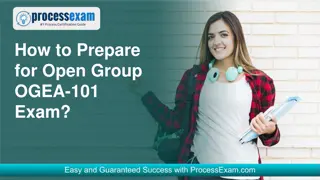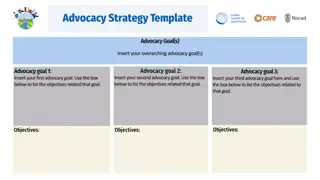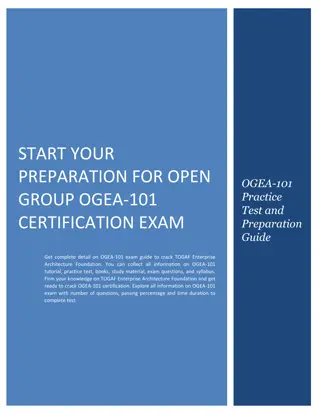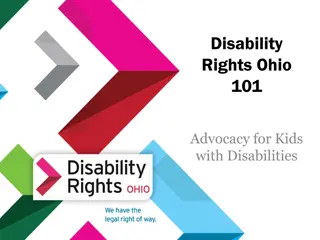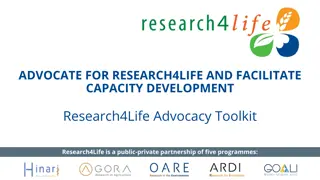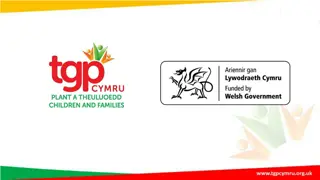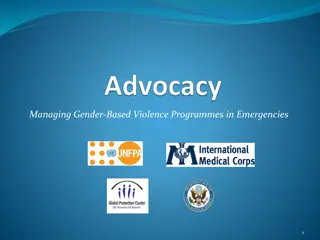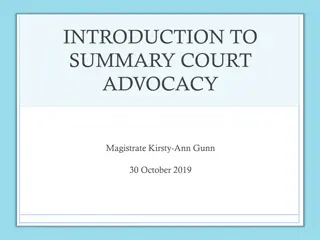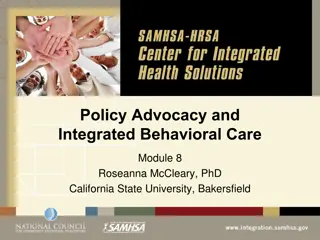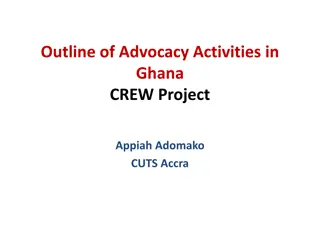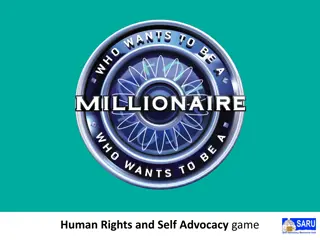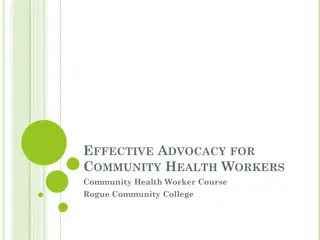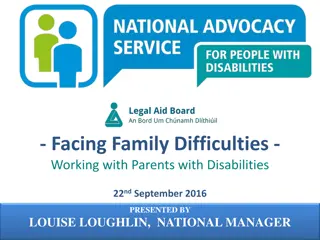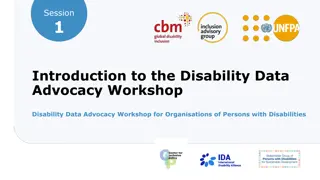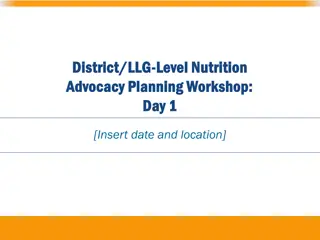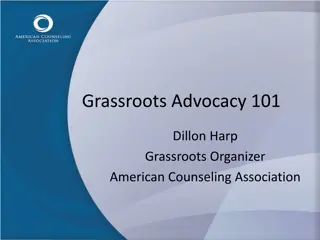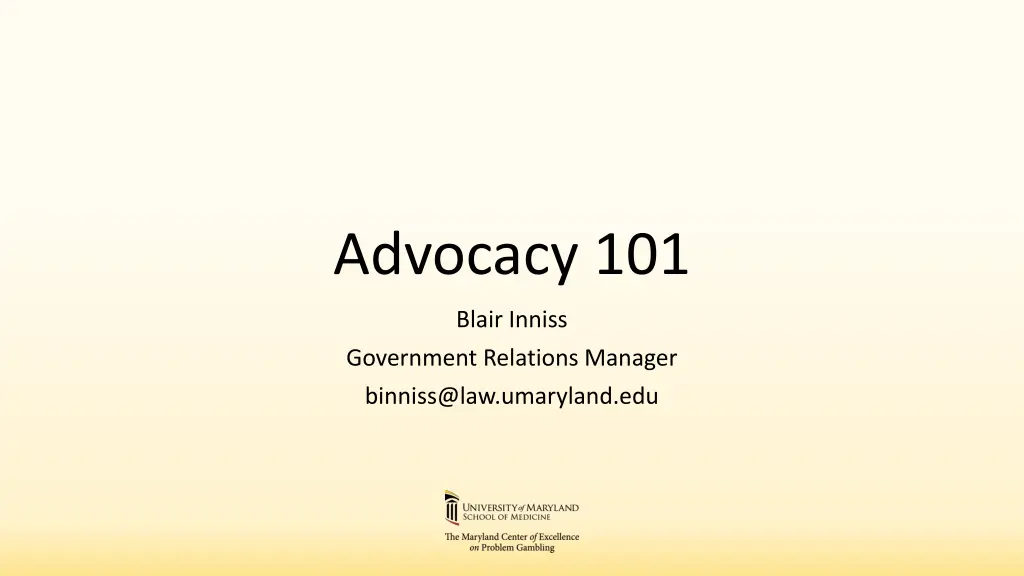
Maryland Center of Excellence on Problem Gambling Initiatives
The Maryland Center of Excellence on Problem Gambling promotes healthy choices and offers key initiatives including public awareness campaigns, prevention programs, research, free training, provider referral directory, peer recovery support, public policy guidance, and a helpline. Learn about lobbying activities in Maryland related to legislative and executive actions.
Download Presentation

Please find below an Image/Link to download the presentation.
The content on the website is provided AS IS for your information and personal use only. It may not be sold, licensed, or shared on other websites without obtaining consent from the author. If you encounter any issues during the download, it is possible that the publisher has removed the file from their server.
You are allowed to download the files provided on this website for personal or commercial use, subject to the condition that they are used lawfully. All files are the property of their respective owners.
The content on the website is provided AS IS for your information and personal use only. It may not be sold, licensed, or shared on other websites without obtaining consent from the author.
E N D
Presentation Transcript
Advocacy 101 Blair Inniss Government Relations Manager binniss@law.umaryland.edu
Mission Statement The Maryland Center of Excellence on Problem Gambling promotes healthy and informed choices regarding gambling and problem gambling through various key initiatives and partnerships. The Center works closely with appropriate state stakeholders and brings together experts from a variety of disciplines including psychiatry, medicine, epidemiology, social work, and law.
Key Initiatives and Resources Public Awareness: Public Awareness: Campaigns through social media, TV, radio, public service announcements, community outreach, public awareness materials and lending library Prevention Programs: Prevention Programs: Targeted to the full age continuum and to diverse populations and at-risk groups Research: Research: To provide evidence-based data on public health aspects of gambling disorders and evaluate and develop evidence-based strategies for prevention and intervention Free Training: Free Training: On problem gambling awareness, prevention and intervention strategies with CEUs
Key Initiatives and Resources Provider Referral Directory: Provider Referral Directory: To provide technical assistance to the health care and behavioral health care providers in Maryland to enhance capacity to address the issue of problem gambling amongst Maryland residents at No Cost. Peer Recovery Support Peer Recovery Support: : To assist individuals dealing with at risk and problem gambling connect with recovery resources within Maryland and to remove any barriers to recovery Public Policy: Public Policy: To provide information regarding strategies to address the impact of gambling on Public Health within Maryland Helpline: Helpline: Maryland Problem Gambling Helpline Maryland Problem Gambling Helpline 1 1- -800 800- -GAMBLER GAMBLER
What is Lobbying? Lobbying activities are defined in Md. Code Ann. Gen. Provisions 5 702 Legislative Action Lobbying Legislative Action Lobbying: A person communicates with a legislative branch official or employee for the purpose of influencing any legislative action and incurs at least $500 in expenses or is compensated at least $2,500 Executive Action Lobbying Executive Action Lobbying: A person communicates with an executive branch official or employee for the purpose of influencing executive action and spends at least $100 or is compensated at least $2,500
What is Advocacy? Merriam-Webster defines advocacy as the act or process of supporting a cause or proposal
Who Can Advocate? Anyone! Anyone! Educating policymakers about the needs of your organization or community is something anyone can do
Maryland Legislative Advocacy The Basics 90-day legislative session for all bills and the budget January 8 through April 7, 2025 January 8 through April 7, 2025 Mostly part-time legislators who have other jobs Lots of work happens outside session Staff of elected officials are important people You can contact the Governor
How To Contact Your Elected Official Ideally, you are registered to vote https://elections.maryland.gov/elections/vote2024/ Who are they? www.mdelect.net Mail, fax, or email letters Hand-written letters are impressive, typed non-form letters are effective Form letters and post cards are the least effective unless in mass numbers Call your legislators Visits
When to Contact Your Elected Official During session: Any time on a bill or budget item you care about If about a bill in their committee, before hearing or immediately after hearing (before they vote) If bill makes it out of committee, contact immediately after the committee vote (within a day or two at most) After session: Immediately after session to THANK those who supported your position For a meeting or site visit, any time from May through November
Contact the Governor Governor Wes Moore State House 100 State Circle Annapolis, MD 21401 410-974-3901 or 800-811-8336 fax: 410-974-3275 - tdd: (410) 333-3098 https://governor.maryland.gov/contact-the-governor/
How a Bill Becomes a Law First Reading Bill is introduced and assigned to a standing committee Email binniss@law.umaryland.edu if to be added to legislative listserv Find bill info at www.mgaleg.maryland.gov An average of 2,500 bills are An average of 2,500 bills are introduced in each Session introduced in each Session about 600 pass about 600 pass
Standing Committees Every member of Senate (except the Senate President) and every member of House (except the House Speaker) sits on one of the standing committees 6 standing committees in the Senate 7 standing committees in the House Committees each have certain subject areas they oversee There is some overlap Senate Committees Senate Committees House Committees House Committees
Hearing Almost every decision on a bill happens at the committee level this is the place to focus your attention and these are the people
Testifying Testimony Can be written and/or oral Public must sign up prior to the hearing Keep oral comments brief 2-3 minutes MAX Listen to others testifying and don t be redundant Decide what are the 2-3 main points you need to tell that group of people in that setting at that time Tell them your story Committee members can ask questions Don t worry about technical questions, just tell it from your perspective and let them know you ll get back to them with the technical answers (then follow up)
Voting, Crossover, and Presentment Committee votes Favorable, favorable with amendments, unfavorable No vote bill kept in the drawer or dies in committee Third Readings in originating chamber Vote sends bill to the opposite chamber where the process starts over Final step is presentment to the Governor A bill that is timely presented to the Governor will become law unless vetoed
Advocacy Opportunities Testimony Stay in the loop Organize supporters on important issues Social media
Advocacy Survival Skills Accentuate the positive Plan for small wins Present the issues in the way you want others to see them Check your facts Keep it simple Be passionate and persistent Be prepared to compromise Enjoy yourself!
Hot Topics for 2025 Increased funding to the Problem Gambling Fund Geofencing around universities Youth Suicide Prevention School Program iGaming Data sharing Nothing is guaranteed Nothing is guaranteed
Advocacy Works You can have a voice in the legislative process Advocates, service providers, and real people have always made an impact Most elected officials are interested in your experience Don t forget about using local media and social media when appropriate If you would like to be part of responsible gambling advocacy efforts in 2025, email If you would like to be part of responsible gambling advocacy efforts in 2025, email binniss@law.umaryland.edu binniss@law.umaryland.edu to be added to our email list! to be added to our email list!
Thank You Blair Inniss Government Relations Manager binniss@law.umaryland.edu

